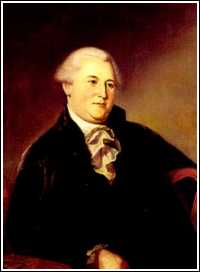->
FRtR > Biographies > Gunning Bedford Jr.
A Biography of Gunning Bedford, Jr. 1747-1812
*** Quote ***
 Bedford was born in 1747 at Philadelphia and reared there. The fifth
of seven children, he was descended from a distinguished family
that originally settled in Jamestown, VA. He usually referred to
himself as Gunning Bedford, Jr., to avoid confusion with his
cousin and contemporary Delaware statesman and soldier, Col.
Gunning Bedford.
Bedford was born in 1747 at Philadelphia and reared there. The fifth
of seven children, he was descended from a distinguished family
that originally settled in Jamestown, VA. He usually referred to
himself as Gunning Bedford, Jr., to avoid confusion with his
cousin and contemporary Delaware statesman and soldier, Col.
Gunning Bedford.
In 1771 signer Bedford graduated with honors from the College of
New Jersey (later Princeton), where he was a classmate of
James
Madison. Apparently while still in school, Bedford wed Jane B.
Parker, who bore at least one daughter. After reading law
with Joseph Read in Philadelphia, Bedford won admittance to the
bar and set up a practice. Subsequently, he moved to Dover and
then to Wilmington. He apparently served in the Continental
Army, possibly as an aide to General Washington.
Following the war, Bedford figured prominently in the politics of
his state and nation. He sat in the legislature, on the state
council, and in the Continental Congress (1783-85). In the latter
year, he was chosen as a delegate to the Annapolis Convention but
for some reason did not attend. From 1784 to 1789 he was attorney
general of Delaware.
Bedford numbered among the more active members of the
Constitutional Convention, and he missed few sessions. A large
and forceful man, he spoke on several occasions and was a member
of the committee that drafted the Great Compromise. An ardent
small-state advocate, he attacked the pretensions of the large
states over the small and warned that the latter might be forced
to seek foreign alliances unless their interests were
accommodated. He attended the Delaware ratifying convention.
For another 2 years, Bedford continued as Delaware's attorney
general. In 1789 Washington designated him as a federal district
judge for his state, an office he was to occupy for the rest of
his life. His only other ventures into national politics came in
1789 and 1793, as a Federalist presidential elector. In the
main, however, he spent his later years in judicial pursuits, in
aiding Wilmington Academy, in fostering abolitionism, and in
enjoying his Lombardy Hall farm.
Bedford died at the age of 65 in 1812 and was buried in the First
Presbyterian Churchyard in Wilmington. Later, when the cemetery
was abandoned, his body was transferred to the Masonic Home, on
the Lancaster Turnpike in Christiana Hundred, DE.
 Bedford was born in 1747 at Philadelphia and reared there. The fifth
of seven children, he was descended from a distinguished family
that originally settled in Jamestown, VA. He usually referred to
himself as Gunning Bedford, Jr., to avoid confusion with his
cousin and contemporary Delaware statesman and soldier, Col.
Gunning Bedford.
Bedford was born in 1747 at Philadelphia and reared there. The fifth
of seven children, he was descended from a distinguished family
that originally settled in Jamestown, VA. He usually referred to
himself as Gunning Bedford, Jr., to avoid confusion with his
cousin and contemporary Delaware statesman and soldier, Col.
Gunning Bedford.